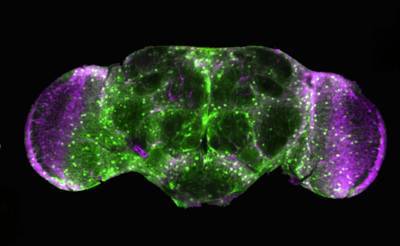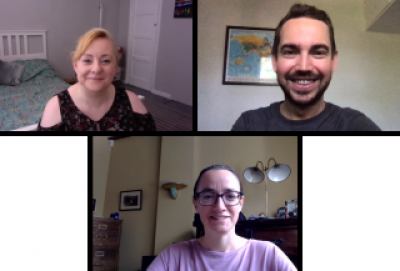UCL IHA Virtual Symposium: Neurodegeneration in Flies
This seminar series brings together researchers from around the globe who study neurodegenerative diseases and age-related neurodegeneration using flies.
The fruit fly Drosophila is an incredibly useful model organism for studying neurodegenerative disease due to its short lifespan and wide array of genetic tools.
Our sessions will feature world-leading researchers in the field, as well as early-career researchers, sharing their latest findings in neurodegeneration.
All sessions will be held on Thursdays at 16:00 London, UK time, dates follow below.
Time: Nov 7, 2024 04:00 PM London
Join Zoom Meeting
https://ucl.zoom.us/j/97325352771?pwd=VmcanbtSetkfe796TSwzAslvCRsAB5.1
Meeting ID: 973 2535 2771
Passcode: 313615
To keep conversations going after the talks, we have set up a Slack workspace for Neurodegeneration in Flies. Please join in to post and respond to follow-up questions for speakers, job adverts, requests for advice or collaboration, and general conversation about the joys of working with flies! Join via this link: Slack workspace for Neurodegeneration in Flies.
Previous Talk
Upcoming Speakers
7th November 2024Speaker: Prof Emi Ngoshi, University of Geneva, Switzerland | |
5th December 2024Speaker: tbc | |
9th January 2025Speaker: Amita Sehgal, University of Pennsylvania, USA | |
6th February 2025Speaker: tbc
| |
6th March 2025Speaker: tbc
| |
Past Speakers
2024
Atsushi Sugie, Establishment of Methods for Evaluating Neuroaxonal Degeneration and Research on Molecular Mechanisms for Neuronal Maintenance
Subramaniam Ganesh, Role of glycogen in neuronal health and disease
Hyung Don Ryoo, The Integrated Stress Response in proteostasis, metabolism, and in degenerative disease models of Drosophila
Maggie Pearce, Role for gila in protein aggregate spreading in neurodegenerative diseaseMaggie Pearce, Role for gila in protein aggregate spreading in neurodegenerative disease
Thomas Vaccari, Regulation of neuronal health in Drosophila melanogaster
Aaron Voigt, Reducing translation fidelity to cure polyglutamine diseases?
2023
Ruben Cauchi, Linking Genetic Risk Factors to ALS Pathophysiology
Doris Kretzschmar, Connecting sleep disruptions and Alzheimer's disease
Natalia Sanchez-Soriano, Investigating cellular mechanisms of brain ageing
Ines Hahn, Coordinating cytoskeletal dynamics-why is it important for neuronal health and disease
Roman Praschberger, Cellular identity modulates pathogenic a-synuclein and tau toxicity.
Hakeem Lawal, What's Drosophila got to do with it? Using Flies to investigate mechanisms of synaptic transmission relevant to aging and Parkinson's disease.
Owen Peters, Glial function of phosphoinositide metabolising enzymes in fly models of Alzheimer's disease and injury
Marc Freeman, Sarm1 signaling in the injured nervous system
Ryan West, The Role of Ataxin2 in Drosophila models of C9Orf72-related Motor Neurone Disease expressing 1000-repeat dipeptide-repeats
Veronique Monnier, GAA-repeat-expansion-based Drosophila models to explore therapies in Friederich ataxia.
2022
Kerri Kinghorn, Unravelling the gut-brain axis in Parkinson's disease.
Manish Jaiswal, Identification of novel regulators of mitochondrial fusion through genetic screens in Drosophila.
Joseph Bateman, MIochondrial stress signalling, metabolism and neurodegeneration in Drosophila.
Pierre Dourleen, Functional characterisation of Alzheimer's Disease genetic risk factors in Drosophila.
Miguel Martins, Mitochondria and neurodegneration.
Rebeka Popovic, Perk signalling from the gut to the brain in a Parkinson's disease model.
Erik Storkebaum, Lost in translation: mismatch between codon demand and tRNA supply in neurodegenerative disease.
Katerina Papanikolopoulou, The Cys sense: Tau as a redox-regulated protein.
Niamh O'Sullivan, Investigating the role of ER proteins in motor neuron degeneration.
Flaviano Giorgini, The kynurenine pathway and neurodegeneration: from mechanisms to therapeutics.
Robert Fueda, The origin and evolution of serotonergic neurons.
Grish Ratnaparkhi, The VAPB social network: at the crossroads of ER stress, proteostasis and inflammation.
Daniela Zarnescu, Modelling TDP-43 proteinopathies in ALS and FTD relevant circuits in Drosophila.
2021
Josh Dubnau, A behavioral screen for mediators of TDP-43 neurodegeneration identifies SF2/SRSF1 among a group of potent suppressors in both neurons and glia.
Kyoung Sang Cho, Novel Alzheimer's disease risk genes associated with the membrane trafficking pathway identified in the Korean population.
Kristi Wharton, Suppression of motor circuit dysfunction and neurodegeneration associated with ALS.
Kanae Ando, What triggers tau accumulation in neurodegenerative diseases?
Mani Ramaswami, Neuronal RNP granules and Ataxin-2: their roles in neural function and disease.
James Hodge, Studying the behavioural and neural circuit changes accompanying ageing and neurodegenerative disease in flies.
Ko-Fan Chen, A neuroprotective role of circadian clock in neurodegeneration?.
James Jepson, How does potassium channel hyperfunction cause dystonia? Defining critical cell-types and developmental windows using a Drosophila knock-in model.
Jimena Alejandra Sierralta, Studying brain metabolism using Drosophila.
Leeanne McGurk, PARsing out TDP-43 in motor neuron disease.
Mamta Rai, Muscle-stress signaling via myokine preserves CNS proteostasis during aging.
Cahir O'Kane, A neuron within a neuron - axonal endoplasmic reticulum and its links to hereditary spastic paraplegia.
Tom Lloyd, Mechanistic links between nucleocytoplasmic transport and proteostasis in ALS/FTD.
Gabriella Zuniga, Tau-induced deficits in nonsense-mediated RNA decay contribute to neurodegeneration.
Angela Giangrande, Immune cells within and outside the nervous system: an evolutionarily conserved pathway.
China Byrns, Glia: Friend and Foe in Traumatic Brain Injury.
Xinnan Wang, Mitochondrial homeostasis in neurodegeneration.
Adrian Beckmann, Pathogenic Tau disrupts the cellular program that maintains neuronal identity.
Bess Frost, Transposable element activation in neurodegenerative tauopathies
Patricia Jarabo Blazquez, A feedback loop for lethality: glioblastoma and circadian clock
Nathan Woodling, Cell-type-specific modulation of longevity and Amyloid-beta toxicity by neurons and glia
Shinya Yamamoto, The roles of TM2D genes in Alzheimer’s Disease and Notch signaling
Teresa Niccoli, Screening for modifiers of C9orf72 hexonucleotide repeat toxicity.
Manolis Fanto, Neurodegeneration through autophagy dysfunctions
Li Li, A Mitochondrial Membrane-Bridging Machinery is a Drug Target for Healthy and Unhealthy Aging
Sergio Casas Tinto, Cell to cell communication in Glioblastoma-induced neurodegeneration
Tyler Fortuna, DDX17 is a modifier of mutant FUS Toxicity in vivo
Mary Logan, Exploring glial transcriptional responses to axon injury in Drosophila
Owen Peters, Drosophila as a model to investigate genes associated with increased risk of developing Alzheimer's disease
Nancy Bonini, A Drosophila approach for traumatic brain injury highlights a glial response.
Magda Atilano, Enhanced insulin signalling ameliorates C9orf72 hexanucleotide repeat expansion toxicity in Drosophila
2020
Udai Pandey, Identifying genetic modifiers and molecular pathways involved in human motor neuron disease.
Shyama Nandakumar, Cell Cycle Re-entry in the adult Drosophila brain.
Alex Whitworth, Cambridge University, UK. Mechanisms of mitochondrial dysfunction in Parkinson’s disease.
Abby Olsen, Harvard Medical School, USA. A Drosophila Model for Defining the Genetic Contribution of Glia to Parkinson’s Disease.
Mel Feany, Harvard Medical School, USA. Common mechanisms in neurodegenerative disease pathogenesis.
James Catterson, University of Edinburgh, UK. Laminins to the Rescue! Aβ toxicity is rescued by protein retention in the ER.
Joshua Shulman, Baylor College of Medicine, USA. The Brain Transcriptome in Aging and Alzheimer’s Disease.
Amritpal Mudher, University of Southampton, UK. Tau tangles in Drosophila models of tauopathy - fact or fiction?.
Lovesha Sivanantharajah, University of Bangor, UK.
Patrik Verstreken, VIB-KU Leuven, Center for Brain and Disease Research, Belgium. The cellular phase of Parkinson's disease.
Pablo Largo-Barrientos, VIB-KU Leuven, Center for Brain and Disease Research, Belgium. The pathogenic interaction of synaptic Tau and Synaptogyrin-3: from fruit flies to mice
Pedro Fernandez-Funez, University of Minnesota Medical School, USA. Unravelling the intrinsic and extrinsic mechanisms underlying the toxicity of the prion protein.
Ryan Myers, University of Minnesota Medical School, USA. Y225A suppresses the toxicity of human prion protein by inducing long-range changes that stabilize a critical 3D domain.
Sean T Sweeney, University of York, UK. Identifying pathological events and therapeutics in FTD-ALS using Drosophila.
Chris Ugbode, University of York, UK. Identifying new roles for JNK in the regulation of Neuronal Antioxidant Responses.
Hugo Bellen, Baylor College of Medicine, USA. The study of rare neurological diseases drives discoveries for common diseases.




 Close
Close


